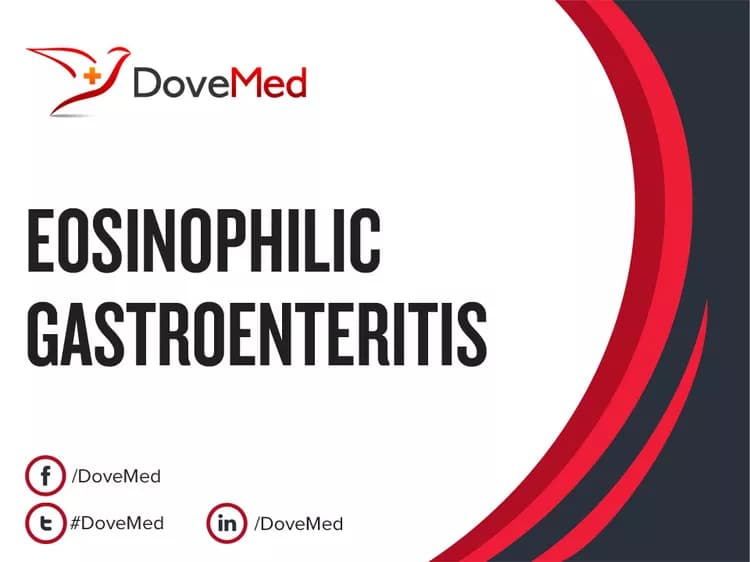What are the other Names for this Condition? (Also known as/Synonyms)
- EG (Eosinophilic Gastroenteritis)
- Eosinophilic Enteritis
- Eosinophilic Gastritis
What is Eosinophilic Gastroenteritis? (Definition/Background Information)
- Eosinophilic Gastroenteritis (EG) is a rare digestive disorder, of unknown cause. It is characterized by various symptoms and medical issues that affect the gastrointestinal (GI) tract
- Individuals with EG have eosinophils, a type of white blood cells, in one or more of the three layers of the GI tract. Eosinophils have been noted in the esophagus, stomach, small, and large intestines; which infiltrate and damage the walls of these organs
- Common physical signs of the disorder include abdominal pain, nausea, vomiting, and diarrhea. The condition is treated using medications and dietary control
Who gets Eosinophilic Gastroenteritis? (Age and Sex Distribution)
- Eosinophilic Gastroenteritis are found in both children and adults
- Both males and females (of all ages) are affected. A slightly higher number of cases have been diagnosed in males, compared to females
- The condition most commonly occurs in people of Caucasian descent
What are the Risk Factors for Eosinophilic Gastroenteritis? (Predisposing Factors)
Individuals, who suffer from atopy, or heightened sensitivity to allergic reactions, are higher prone to developing Eosinophilic Gastroenteritis. This means that individuals suffering from hay fever, asthma, and food allergies, have a higher risk.
It is important to note that having a risk factor does not mean that one will get the condition. A risk factor increases ones chances of getting a condition compared to an individual without the risk factors. Some risk factors are more important than others.
Also, not having a risk factor does not mean that an individual will not get the condition. It is always important to discuss the effect of risk factors with your healthcare provider.
What are the Causes of Eosinophilic Gastroenteritis? (Etiology)
- Currently, the cause of Eosinophilic Gastroenteritis is unknown
- It has been found that individuals with the condition have higher than normal levels of IgE (a type of antibody) and eosinophils in their tissues and blood. These are thought to be at elevated levels, because of T lymphocyte (a type of white blood cell) related imbalances
What are the Signs and Symptoms of Eosinophilic Gastroenteritis?
Common signs and symptoms of Eosinophilic Gastroenteritis include:
- Anemia
- Weight loss
- Nausea and vomiting
- Abdominal pain, cramping
- Diarrhea
- Dysphagia (swallowing difficulties)
In children, other symptoms are often present, including:
- Growth retardation
- Delayed puberty, amenorrhea (an abnormal absence of menstrual period)
How is Eosinophilic Gastroenteritis Diagnosed?
Diagnosis of Eosinophilic Gastroenteritis is often difficult, because symptoms resemble other clinical disorders. To diagnose EG, an eosinophilic infiltration in the GI tract, must be identified. In order to do this, biopsies have to be conducted.
The following diagnostic procedures are helpful:
- Physical examination with medical history
- Biopsies are done by collecting cells or tissue samples from the upper gastrointestinal tract, the stomach, or the small intestine. If greater than 20 eosinophils per high-power microscope field are present, then EG can be confirmed
- Furthermore, histological studies of cells and tissues may show premature cell death (epithelial cell necrosis) or tissue degeneration (atrophy). If either of these are present, then EG is suspected
- Imaging studies may also be conducted by a medical professional. Radiographic imaging may show enlarged gastric folds, ulcerations, and the formation of polypoid lesions (polyp-like mass).
- Ultrasounds and CT scans may show thickening of the intestinal wall and build-up of ascitic fluid (in the abdomen); both are indications that the condition may likely be present
Many clinical conditions may have similar signs and symptoms. Your healthcare provider may perform additional tests to rule out other clinical conditions to arrive at a definitive diagnosis.
What are the possible Complications of Eosinophilic Gastroenteritis?
- Complications may arise during the treatment of Eosinophilic Gastroenteritis. Often, many drugs and medicines that are prescribed, may have negative side effects
- If the disorder has progressed and become detrimental to the individual’s health, surgery may be required. Surgery has its risks and complications.
How is Eosinophilic Gastroenteritis Treated?
- To treat Eosinophilic Gastroenteritis, dietary changes are suggested. Your healthcare provider may plan your diet and create a list of foods, which have to be eliminated from the diet, in order to improve symptoms. Common foods that are excluded include wheat, soy, gluten, milk, eggs, and beef
- Oral glucocorticoisteroids (type of steroid hormones) are suggested for individuals, who have abdominal or intestinal obstructive symptoms
- Surgery may be suggested if EG progressively worsens. Surgery may be performed to remove pyloric (lower end portion of stomach) or small bowel obstructions
How can Eosinophilic Gastroenteritis be Prevented?
- Currently, no preventative measures are available for Eosinophilic Gastroenteritis
- Early detection and treatment of the disease are important to prevent the symptoms from becoming too severe/adverse
What is the Prognosis of Eosinophilic Gastroenteritis? (Outcomes/Resolutions)
- Severe malabsorption and malnutrition can occur, if Eosinophilic Gastroenteritis is untreated
- With prompt diagnosis and management of the condition, the long-term prognosis of the disorder is favorable
Related Articles
Test Your Knowledge
Asked by users
Related Centers
Related Specialties
Related Physicians
Related Procedures
Related Resources
Join DoveHubs
and connect with fellow professionals


0 Comments
Please log in to post a comment.